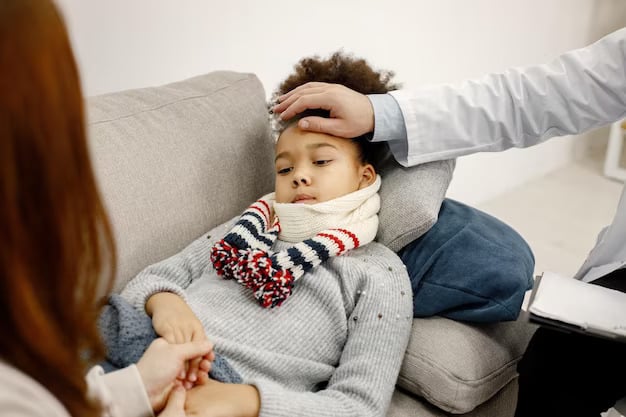Germs Happen! What to Do When the Sniffles Hit Circle Time
 You’re mid-circle time. You’ve just started a sweet #rhyme when little Emma’s nose starts dripping like a leaky faucet. Or maybe Max’s cheeks flush, and he looks … not so chipper. What do you do next?
You’re mid-circle time. You’ve just started a sweet #rhyme when little Emma’s nose starts dripping like a leaky faucet. Or maybe Max’s cheeks flush, and he looks … not so chipper. What do you do next?
Don’t worry — you’ve got this. Handling childhood illness well doesn’t have to be scary. Think of it more like being a “sickness detective + caring coach” in your #classroom.
1. Spot the Signs (Before They Spread)
Some signals aren’t obvious — but keeping an eye out can make all the difference:
-
Sudden fever (above 100°F)
-
Persistent coughing, difficulty breathing, wheezing
-
Rash that’s new and spreading
-
Vomiting or diarrhea
-
Eye drainage, ear pain, or sore throat
-
Unusual lethargy or irritability
If one of these signs appears, follow your exclusion criteria (i.e. when a child should be sent #home). The Creating Safe & Healthy Child Care Environments course from ChildCareEd helps you understand exclusion rules, how germs spread, and which practices prevent illness in day-to-day care.
2. Act Swiftly — But Calmly
Once you identify a possible illness:
-
Move the child to a quiet, supervised area (away from the group but still visible)
-
Reassure them: “You’re #safe. I’m going to help you.”
-
Contact the #parent or #emergency contact
-
Encourage fluids (if allowed) and rest
-
Sanitize surfaces and wash your hands thoroughly
Don’t forget: you don’t need to diagnose — you just manage symptoms and reduce spread.
3. Preventing Germ Parties
Prevention is the name of the game. Here are some fun, practical strategies:
-
Handwashing songs — make 20 seconds feel like a dance party
-
“Germ detectives” game — have children point out spots to clean
-
Staggered snack shifts — fewer hands touching same items
-
Enforce no sharing of cups or utensils
-
Proper ventilation and cleaning routines
The Healthy Starts: Safety, Nutrition, and Wellness in Child Care course is a great resource to deepen your understanding of preventive #health, nutrition, chronic issues, and allergy management.
4. Document & Communicate
Every time illness strikes, notes matter:
-
Record symptoms, when they began, temperature, who was around
-
Share detailed reports with #parents (“Maria had a 100.5°F temp at 10:15 am, complained of stomach pain”)
-
Know your state or federal health & #safety requirements so your documentation meets standards
This comes up in the Health & Safety Requirements for Childcare Providers course, which walks you through national guidelines, immunization schedules, exclusion rules, and #emergency-response. Childcare Education
Also, check out the Federal Health and Safety Requirements resource for more on what childcare providers must follow per federal guidelines.
5. When It’s All Over — Clean Up and Reflect
Once the child is picked up and you’re back to “business as usual”:
-
Deep-clean toys, surfaces, shared items
-
Launder bedding, sanitize soft items
-
Reflect: Could something in your routine be improved?
-
Use training and refreshers to stay sharp
In fact, the article “The Importance of Health and Safety Training” from ChildCareEd is a wonderful read to remind yourself why staying educated is so crucial — for children’s safety, your confidence, and compliance with licensing. Childcare Education
Ready to Level Up?
If you liked what you read, here are three courses at ChildCareEd that complement this topic beautifully:
-
Health & Safety Requirements for Childcare Providers — for grounding in rules, immunizations, exclusion, and emergencies Childcare Education
-
Creating Safe & Healthy Child Care Environments — for designing spaces that reduce risk and support child well-being Childcare Education
-
Healthy Starts: Safety, Nutrition, and Wellness in Child Care — for a holistic approach to illness prevention, chronic conditions, and nutrition in care settings Childcare Education
Final Tip: Kindness Is Your Secret Weapon
Kids won’t always demand “clean hands” — but they will respond to care, #empathy, and a calm caregiver. When Emma feels queasy, your voice, your presence, your kindness may be just as healing as any measure.
So the next sniffle in your circle time? You’ve got the skills, the resources, and the heart to manage it — wisely and warmly.
Don’t forget to follow ChildCareEd.com on social media for updates, tips, job postings, and community support on this rewarding journey in #early-childhood education #health-and-safety #health-and #healthy
- Administering Basic Health and Safety ONLINE
- Emergency and Disaster Preparedness
- Character Development for Childcare Professionals
- Moving About the Classroom: Effective Transitions for Everyday
- Baby Steps to Milestones ONLINE
- Engaging Indoor Activities for Inclement Weather
- Writing Training Goals & Objectives
- Shoo, Germs! Don't Bother Me!
- Setting the Stage: Story Time
- You're Not My Friend Anymore: Learning Conflict Resolution
- Germs Happen! What to Do When the Sniffles Hit Circle Time
- How to Create a Safe and Healthy Child Care Environment
- Circle Time Ideas That Keep Young Children Engaged
- Preventing Infectious Diseases in Illinois
- How to Handle Challenging Behaviors in Early Childhood Settings
- Infection Control Practices for Child Care Settings
- Managing challenging behavior without shame: a provider’s toolkit
- Big feelings: helping kids calm down (age-by-age)
- Handwashing for kids: fun ways to teach it
- How to set clear rules without yelling
- How to handle hitting in toddlers
- How can I talk to parents about biting and hitting in my program?
- How can we reduce germs and prevent falls this fall in child care?
- Emotions for Kids: Fun Activities to Teach Feelings and Self-Control
- Creating a Positive Learning Environment: Positive Guidance That Works
- Can cleaning be a learning activity in child care?